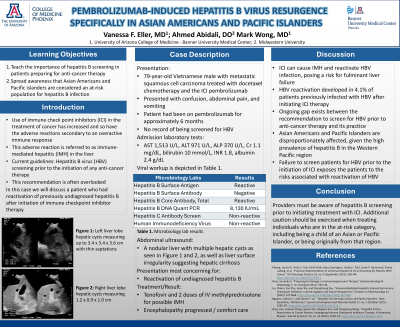Sunday Poster Session
Category: Liver
P1380 - Pembrolizumab-Induced Hepatitis B Virus Resurgence Specifically in Asian Americans and Pacific Islanders
Sunday, October 27, 2024
3:30 PM - 7:00 PM ET
Location: Exhibit Hall E

Has Audio

Vanessa F. Eller, MD
University of Arizona College of Medicine
Phoenix, AZ
Presenting Author(s)
Vanessa F. Eller, MD1, Ahmed Abidali, DO2, Mark Wong, MD3
1University of Arizona College of Medicine, Phoenix, AZ; 2Midwestern University, Glendale, AZ; 3Banner University Medical Center, Phoenix, AZ
Introduction: The use of immune checkpoint inhibitors (ICI) in the treatment of cancer has increased in the last decade, and so have the adverse reactions secondary to this therapy. In the liver, this adverse effect is referred to as immune-mediated hepatitis (IMH). Currently, the American Society of Clinical Oncology recommends hepatitis B virus (HBV) screening prior to the initiation of any anti-cancer therapy. However, there seems to be a gap between this recommendation and its utilization.
Case Description/Methods: A 79-year-old Vietnamese male with a history of metastatic squamous cell carcinoma treated with chemotherapy and the ICI pembrolizumab as bridging therapy presented with confusion, abdominal pain, and vomiting. Admission laboratory tests revealed aspartate transaminase 1,513 U/L, alanine transaminase 971 U/L, alkaline phosphatase 370 IU/L, creatinine 1.1 mg/dL, bilirubin 10 mmol/L, and albumin 2.4 g/dL. The viral panel showed hepatitis A antibody reactive, hepatitis C antibody negative, hepatitis B surface antigen positive, hepatitis B surface antibody negative, and hepatitis B core antibody total positive. HBV DNA quantification was 8,130 IU/mL. Abdominal ultrasound revealed a nodular liver with multiple hepatic cysts. The patient had no record of being screened for HBV before initiation of immunotherapy. Reactivation of previously undiagnosed HBV was the most likely diagnosis. The patient was started on the antiviral medication tenofovir. He also received 2 doses of IV methylprednisolone as treatment for possible IMH. The encephalopathy progressed and the family chose comfort care.
Discussion: While most cases of IMH resolve with discontinuation of the ICI and treatment with immunosuppression medications, there have been reports of serious outcomes such as the reactivation of HBV infection. A systematic review published by Zhao et al. in 2022 demonstrated that HBV reactivation developed in over 4% of patients previously infected by HBV after beginning ICI therapy. There seems to be an ongoing gap between the recommendation to screen for HBV prior to the initiation of any anti-cancer therapy and its practice, putting patients at risk for HBV reactivation. Given the high prevalence of hepatitis B in the Western Pacific region, Asian Americans and Pacific Islanders are disproportionately affected. It is of the utmost importance that providers be aware of HBV screening prior to starting treatment with ICI and that additional caution be exercised when treating at-risk individuals.
Disclosures:
Vanessa F. Eller, MD1, Ahmed Abidali, DO2, Mark Wong, MD3. P1380 - Pembrolizumab-Induced Hepatitis B Virus Resurgence Specifically in Asian Americans and Pacific Islanders, ACG 2024 Annual Scientific Meeting Abstracts. Philadelphia, PA: American College of Gastroenterology.
1University of Arizona College of Medicine, Phoenix, AZ; 2Midwestern University, Glendale, AZ; 3Banner University Medical Center, Phoenix, AZ
Introduction: The use of immune checkpoint inhibitors (ICI) in the treatment of cancer has increased in the last decade, and so have the adverse reactions secondary to this therapy. In the liver, this adverse effect is referred to as immune-mediated hepatitis (IMH). Currently, the American Society of Clinical Oncology recommends hepatitis B virus (HBV) screening prior to the initiation of any anti-cancer therapy. However, there seems to be a gap between this recommendation and its utilization.
Case Description/Methods: A 79-year-old Vietnamese male with a history of metastatic squamous cell carcinoma treated with chemotherapy and the ICI pembrolizumab as bridging therapy presented with confusion, abdominal pain, and vomiting. Admission laboratory tests revealed aspartate transaminase 1,513 U/L, alanine transaminase 971 U/L, alkaline phosphatase 370 IU/L, creatinine 1.1 mg/dL, bilirubin 10 mmol/L, and albumin 2.4 g/dL. The viral panel showed hepatitis A antibody reactive, hepatitis C antibody negative, hepatitis B surface antigen positive, hepatitis B surface antibody negative, and hepatitis B core antibody total positive. HBV DNA quantification was 8,130 IU/mL. Abdominal ultrasound revealed a nodular liver with multiple hepatic cysts. The patient had no record of being screened for HBV before initiation of immunotherapy. Reactivation of previously undiagnosed HBV was the most likely diagnosis. The patient was started on the antiviral medication tenofovir. He also received 2 doses of IV methylprednisolone as treatment for possible IMH. The encephalopathy progressed and the family chose comfort care.
Discussion: While most cases of IMH resolve with discontinuation of the ICI and treatment with immunosuppression medications, there have been reports of serious outcomes such as the reactivation of HBV infection. A systematic review published by Zhao et al. in 2022 demonstrated that HBV reactivation developed in over 4% of patients previously infected by HBV after beginning ICI therapy. There seems to be an ongoing gap between the recommendation to screen for HBV prior to the initiation of any anti-cancer therapy and its practice, putting patients at risk for HBV reactivation. Given the high prevalence of hepatitis B in the Western Pacific region, Asian Americans and Pacific Islanders are disproportionately affected. It is of the utmost importance that providers be aware of HBV screening prior to starting treatment with ICI and that additional caution be exercised when treating at-risk individuals.
Disclosures:
Vanessa Eller indicated no relevant financial relationships.
Ahmed Abidali indicated no relevant financial relationships.
Mark Wong: Gilead – Speakers Bureau.
Vanessa F. Eller, MD1, Ahmed Abidali, DO2, Mark Wong, MD3. P1380 - Pembrolizumab-Induced Hepatitis B Virus Resurgence Specifically in Asian Americans and Pacific Islanders, ACG 2024 Annual Scientific Meeting Abstracts. Philadelphia, PA: American College of Gastroenterology.
